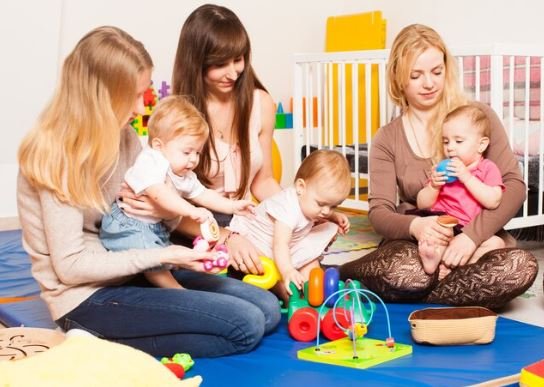Daycare

Introduction
- A service or institution that provides children with supervision and care during certain hours of the day, particularly when their parents or guardians are working or unavailable, is referred to as nursery care, sometimes known as childcare or nursery. Daycare centres are designed to give kids a secure, caring environment in which to grow, play, and socialise while their parents are at work or taking care of other obligations. By providing expert care and early childhood education suited to young children’s developmental requirements, it seeks to assist working families.
- Daycare plays a crucial role for working parents by providing a safe and nurturing environment for their children while they are at work. It allows parents to focus on their jobs with peace of mind, knowing that their children are well cared for. Additionally, daycare contributes significantly to child development by offering structured activities, socialization opportunities, and educational experiences that promote learning, growth, and social skills development in a supportive setting.
1. Types of Daycare
- Diverse kinds of childcare centres accommodate parents’ and kids’ different requirements and preferences. Daycare centres are bigger establishments that have space for several kids and frequently provide socialisation chances, educational activities, and structured programmes. Smaller groups of kids are cared for in a provider’s home during family day care, which offers a more intimate environment and individualised attention. Nursery care services that are offered in the child’s home, providing comfort and familiarity, are referred to as in-home care. Every kind of childcare facility offers benefits, and based on things like location, scheduling, and care preferences, it can be a good fit for a particular family.
- Illustrating the distinctions among various kinds of daycare centres can assist families in selecting the best choice for their requirements. Daycare centres are the best option for families looking for a full-service childcare provider because they provide organised programmes, bigger groups, and a range of activities. For families seeking a more cozy atmosphere, family day care offers a more personal setting with smaller groups and individualised attention. For families who prefer individualised care in a familiar environment, in-home care is a terrific option because it provides convenience and comfort by having the career visit the child at home. Families can make well-informed decisions depending on their tastes, schedules, and daycare needs by being aware of these variations.
- Daycare Centres: These are official establishments that usually provide group child care in classrooms that are appropriate for the children’s ages. They frequently offer a variety of educational and recreational opportunities, well-trained staff, and organised routines.
- Family Day Care: In this arrangement, a few children are cared for by a career in their own house. It can offer customised care and a setting that feels more like home.
- In-Home Care: To take care of their child at home, some families use a babysitter or nanny. Although this choice is flexible, it might not provide the same socialisation possibilities as group care environments.
2.Benefits of Day Care
- Social Development: Children’s social development in creche settings is greatly aided by their interactions with classmates and providers. Children can interact with people in creche settings, pick up social skills like sharing, collaboration, and empathy, and form enduring relationships. Daycare centres teach kids how to deal with social problems, settle disputes, and form friendships through controlled interactions, group activities, and playing. This helps kids acquire social skills that will serve them well in the future.
- Emotional Well-being: A caring atmosphere in creche is essential to promoting kids’ emotional growth and well-being. Children who attend daycare facilities can express themselves, practice self-management skills, and develop resilience in a secure and encouraging environment. Children in childcare centres receive support, consolation, and encouragement from carers as they work through a range of emotions and obstacles. Children who grow up in this supportive atmosphere are more likely to have healthy coping mechanisms, emotional intelligence, and self-control. These traits will serve them well in life.
- Cognitive Growth: Daycare programs play a significant role in stimulating cognitive growth in children through various activities. These activities, such as storytelling, puzzles, and age-appropriate learning materials, are designed to engage children’s minds, encourage problem-solving skills, and promote language development. Daycare environments provide a structured yet playful setting where children can explore, learn, and develop critical thinking abilities, memory retention, and creativity. These cognitive stimulation activities in daycare contribute to children’s overall intellectual growth and readiness for future learning experiences.
- Preparation for School: Daycare plays a crucial role in preparing children for the structured learning environment of school. Through the introduction of routines, following instructions, and engaging in educational activities, daycare helps children develop essential skills and behaviors needed for success in school. Daycare programs emphasize socialization, independence, and early learning experiences, laying a foundation that fosters a smooth transition to formal education. By providing a structured yet nurturing environment, daycare prepares children academically, socially, and emotionally for the challenges and opportunities of school life.
3. Choosing the Right Day Care
When choosing a creche, parents should take into account a number of factors:
- Location: Pick a place that is easy to go to from your house or place of employment.
- Cost: Take into account the associated costs and any possible financial aid.
- Staff Qualifications: Seek out seasoned and qualified nannies who put the security and welfare of the kids first.
- Safety Measures: Verify that the establishment has the necessary safety measures in place, such as secure grounds, emergency protocols, and health regulations.
- Curriculum: Find out about the everyday activities that are provided, such as meals, outdoor play, and educational programmes.
4. Day Care Activities
To keep kids interested, daycare facilities and providers frequently include a variety of activities:
- Educational Play: Use games, toys, and practical activities that are age-appropriate to incorporate learning via play.
- Outdoor Time: To encourage physical fitness and an appreciation of nature, provide chances for outdoor play and exploration.
- Creative Arts: Through narrative, music, dance, and art, foster expression and creativity.
- Structured Learning: Use engaging and interactive lessons to introduce fundamental ideas like letters, numbers, shapes, and colours
5. Parental Involvement
- In order to support their child’s nursery experience, parents are essential. They can assist by being transparent in their communication with creche personnel, talking about their child’s needs and preferences, and taking an active part in parent-teacher conferences or other events. In addition, parents can foster healthy behaviours, assist their child’s emotional and social development, and reinforce the lessons learned in nursery at home. Parents have a critical role in their child’s general development, success in nursery and well-being by continuing to be actively involved in their child’s nursery experience.
- It’s crucial for parents to keep lines of communication open with creche providers in order to stay updated on their child’s development and wellbeing. Asking inquiries about daily activities and routines, setting up regular check-ins or meetings with nursery staff, and voicing concerns or feedback when necessary are all helpful strategies for good communication. Participating in nursery activities can also improve the child’s experience and the parent-provider bond. In order to ensure the best care and learning environment for their child, parents can take part in activities, volunteer opportunities or courses offered by the creche. This encourages cooperation and mutual support.
The nursery experience can be improved for parents’ children by:
- Sustaining Communication: Communicate with careers about your child’s development, hobbies, and any worries.
- Engaging in Activities: Go to any programmes, parent-teacher conferences or activities that the nursery hosts.
- Encouraging At-Home Learning: Complement your child’s creche education with activities that you do at home.
- Building a Positive Relationship: To give your child a collaborative and supportive atmosphere, cultivate a positive relationship with nursery careers.
6. Day Care and Child Development
Research shows that quality daycare can have lasting benefits on children’s development, including:
- Better Social Skills: Nursery attendees frequently see improvements in their social skills, including collaboration, dialogue, and dispute resolution.
- Improved School Readiness: Successful academic transitions to school can be facilitated by early exposure to structured learning and social interactions in daycare.
- Positive Relationships: Creating bonds with creche providers and other children can help children feel emotionally secure and like they belong.
7. Challenges and Solutions
Even though nursery has numerous benefits, parents may encounter difficulties like:
- Separation Anxiety: When a kid first starts daycare, they may feel separation anxiety. This adjustment can be made easier by using reassuring routines and gradual transitions.
- Getting Used to New Schedules and Routines: Adapting to new schedules and routines can be difficult at first. Children can be helped to adapt by having clear expectations and being consistent.
- Behavioral Issues: Parents and careers can effectively manage and resolve issues by addressing behavioural challenges through the use of positive reinforcement, clear limits, and open communication.
For more information refer this link
8.Conclusion
Because they give kids a secure, caring, and educational environment, daycare centres are essential to helping families. To meet diverse needs and choices, they provide a range child care options, from family day care and in-home care to structured daycare centres. Children’s development—including their social, emotional, cognitive, and school readiness—is greatly aided by childcare. Nursery promotes holistic growth and gets kids ready for future learning and life experiences via interactions with peers and careers, fun activities and a caring environment.
Also you can refer my link
FAQs
1.What is daycare?
A creche, sometimes referred to as a preschool or childcare centre, is a facility or programme that offers young children activities, education and supervised care during the day. It guarantees the growth and well-being of children while enabling parents or guardians to attend to other obligations or jobs.
2.What age group does daycare typically cater to?
Children in daycare centres often range in age from newborns (as little as a few weeks old) to preschoolers (around 4-5 years old). Certain daycare facilities might include services for older kids, like summer camps or after-school care.
3.What services are offered at daycare centers?
A variety of services are provided by daycare centres, such as meals and snacks, educational activities, supervised playtime, opportunities for peer socialisation, naptime or rest periods, and occasionally other services including early childhood education, enrichment activities, and parental assistance.
4.What are the benefits of enrolling a child in daycare?
A child’s socialisation with other kids, the development of early learning skills, exposure to organised routines and activities, school readiness, assistance for working parents, and chances for personal development and independence are only a few advantages of enrolling them in creche.
5.How do I choose the right daycare for my child?
A daycare’s location, operating hours, curriculum, safety precautions, staff credentials and experience, hygienic and clean practices, parent testimonials and recommendations, accreditation and licencing, and fit with your child’s needs and temperament are all important considerations. To make sure the facility satisfies your standards and expectations, it’s also crucial to visit it, speak with the staff, and ask questions.

